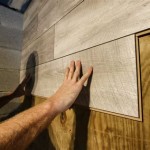Installing Your Own Flooring: A Comprehensive Guide
Installing your own flooring is a rewarding project that can save you money and give your home a fresh, updated look. While it may seem like a daunting task, it's entirely possible with the right tools, preparation, and attention to detail.
Step 1: Preparation
Before you start, it's crucial to prepare the subfloor by removing old flooring, cleaning the surface, and leveling any uneven areas. This ensures a smooth and stable base for your new flooring.
Step 2: Choose the Right Flooring
Determine the type of flooring that best suits your needs and preferences. Consider factors such as durability, moisture resistance, and style. Popular options include hardwood, laminate, vinyl, and carpet.
Step 3: Get the Necessary Tools
Gather all the essential tools for the job, including a circular saw, miter saw, hammer, nail gun, spacers, and a moisture barrier (if required). It's also helpful to have a measuring tape, level, and safety glasses.
Step 4: Install the Underlayment
An underlayment helps reduce noise, absorb impact, and prevent moisture damage. Roll out the underlayment over the prepared subfloor and secure it with tape or staples.
Step 5: Start Laying the Flooring
Follow the manufacturer's instructions for installing your specific flooring type. Start from a corner and work your way across the room, using spacers to ensure even spacing between the planks. Secure the flooring with nails, screws, or glue, depending on the material.
Step 6: Cut and Fit Around Obstacles
When you encounter obstacles like doorways, pipes, or cabinets, measure and cut the flooring to fit around them. Use a miter saw for clean, angled cuts. Always measure twice and cut once to avoid mistakes.
Step 7: Add Finishing Touches
Once the flooring is installed, add baseboards or moldings around the edges to conceal any gaps and give it a finished look. Install quarter rounds or transition strips where different types of flooring meet.
Tips for Success
- Plan your layout carefully before starting.
- Use a level frequently to ensure a flat surface.
- Measure accurately and double-check your cuts.
- Don't rush the process; take your time and do it right.
- Get assistance when handling large or heavy pieces.
Conclusion
Installing your own flooring can be a challenging but rewarding experience. By following these comprehensive steps, choosing the right tools and materials, and paying attention to the details, you can achieve professional-looking results that will enhance your home's beauty and value.

How To Install Laminate Flooring For Beginners

Lay Your Own Wood Floors Installing Real

Easiest 5 Diy Flooring Solutions Learn To Install On Your Own Inc

Installing Vinyl Floors A Do It Yourself Guide The Honeycomb Home

Easiest 5 Diy Flooring Solutions Learn To Install On Your Own Inc

How To Install Your Own Flooring Save Money And Love The Results Tiktok

Make Your Own Plank Flooring Using 1 X 12 Lumber Hallstrom Home

How To Install Hardwood Flooring The Home Depot

How To Install Hardwood Flooring The Home Depot

How To Install Vinyl Plank Flooring As A Beginner Home Renovation
Related Posts








